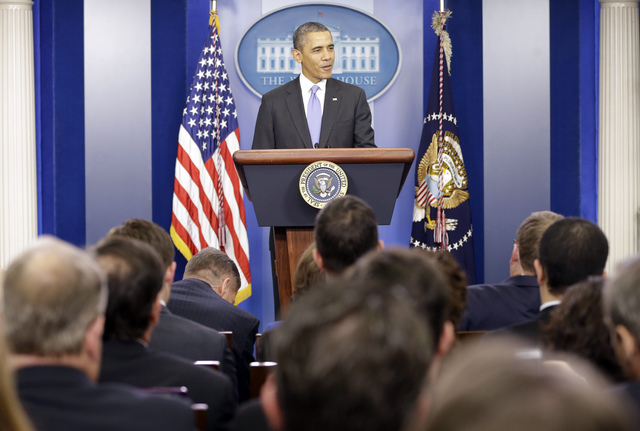December 27-2013

President Obama charged Friday that congressional efforts to impose more sanctions on Iran could spike the negotiations with Iran and leave the United States with no means to stop Iran’s nuclear program other than going to war.
Obama defended his effort to stop Congress from passing any more sanctions at considerable length during his end-of-the-year news conference Friday.
Many critics of the six-month interim agreement with Iran have complained that the agreement doesn’t stop Iran from enriching, just slows down the enrichment. Obama accused them of being illogical, saying if the world didn’t have the interim agreement, Iran could enrich much more uranium in the coming six months.
Some in Congress argue that approving sanctions now that will take effect if the talks collapse will help put more pressure on Iran to negotiate by showing congressional intent. But Iranian Foreign Minister Mohammad-Javad Zarif has said that any new sanctions—even ones that don’t take effect right away—will prompt Iran to walk out of the talks.
Obama said the members of Congress weren’t helping him at all. He said the Islamic Republic certainly doesn’t have any doubts that ”Congress would be more than happy to pass more sanctions.” He complained that the congressional effort simply spikes his own effort “to create an atmosphere in which Iran is willing to move in ways that are uncomfortable for them and contrary to their ideology and rhetoric and their instincts and their suspicions of us.”
It was a surprisingly lengthy and detailed defense of his efforts.
He said the United States must make the effort to reach a negotiated solution with Iran “because the alternative is possibly us having to engage in some sort of conflict to resolve the problem with all kinds of unintended consequences.
“Now, I’ve been very clear from the start, I mean what I say: It is my goal to prevent Iran from obtaining a nuclear weapon. But I sure would rather do it diplomatically. I’m keeping all options on the table, but if I can do it diplomatically, that’s how we should do it. And I would think that would be the preference of everybody up on Capitol Hill because that sure is the preference of the American people.
“And we lose nothing during this negotiation period. Precisely because there are verification provisions in place, we will have more insight into Iran’s nuclear program over the next six months than we have previously.”
He assailed the congressional critics as illogical. “Ironically, if we did not have this six-month period in which we’re testing whether we can get a comprehensive solution to this problem, they [Iran] would be advancing even further on their nuclear program. And in light of all that, what I’ve said to members of Congress—Democrats and Republicans—is there is no need for new sanctions legislation. Not yet.”
He said that if Iran doesn’t agree to tight restrictions on its nuclear program, “it’s not going to be hard for us to turn the dials back, strengthen sanctions even further. I’ll work with members of Congress to put even more pressure on Iran. But there’s no reason to do it right now.
“I’m not surprised that there’s been some talk from some members of Congress about new sanctions. I think the politics of trying to look tough on Iran are often good when you’re running for office or if you’re in office. But as President of the United States right now, who’s been responsible over the last four years, with the help of Congress, in putting together a comprehensive sanctions regime that was specifically designed to put pressure on them and bring them to the table to negotiate — what I’m saying to them, what I’ve said to the international community, and what I’ve said to the American people is let’s test it. Now is the time to try to see if we can get this thing done.
“I’ve heard some logic that says, well, Mr. President, we’re supportive of the negotiations, but we think it’s really useful to have this club hanging over Iran’s head. Well, first of all, we still have the existing sanctions already in place that are resulting in Iran losing billions of dollars every month in lost oil sales. We already have banking and financial sanctions that are still being applied even as the negotiations are taking place. It’s not as if we’re letting up on that.
“I’ve heard arguments, well, but this way we can be assured and the Iranians will know that if negotiations fail even new and harsher sanctions will be put into place. Listen, I don’t think the Iranians have any doubt that Congress would be more than happy to pass more sanctions legislation. We can do that in a day, on a dime.
“But if we’re serious about negotiations, we’ve got to create an atmosphere in which Iran is willing to move in ways that are uncomfortable for them and contrary to their ideology and rhetoric and their instincts and their suspicions of us. And we don’t help get them to a position where we can actually resolve this,” Obama concluded.






















